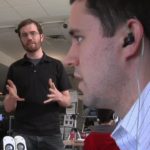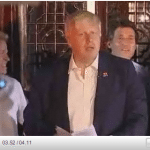Michael Geller back home with a message
 I went to a talk tonight by Michael Geller, noted Vancouver urban planning commentator and developer consultant, hosted by the Planning Institute of BC. He has returned from an 8-month trip abroad, where he visited dozens of cities to explore how they are dealing with change and growth. Naturally, he compared Vancouver with places as diverse as Auckland, Abu Dhabi, Dubai, Beijing and Prague.
I went to a talk tonight by Michael Geller, noted Vancouver urban planning commentator and developer consultant, hosted by the Planning Institute of BC. He has returned from an 8-month trip abroad, where he visited dozens of cities to explore how they are dealing with change and growth. Naturally, he compared Vancouver with places as diverse as Auckland, Abu Dhabi, Dubai, Beijing and Prague.
While I didn’t bring anything to record notes, a number of his ideas and observations stood out and I’m listing many of them below in no particular order.
- All high rise buildings don’t need to look the same (as many do in Vancouver), even row houses could benefit from not sticking with a uniform design.
- Well-designed modular houses are the way of the future, as they are affordable and easy to build. Retired Vancouver Director of Planning Ray Spaxman, who sat on a panel with Michael that evening, cautioned that badly designed modular homes can be a blight. Attention to detail is everything with modular homes.
- Graffiti (tagging) is a scourge seen too often in otherwise beautiful cities – it has destroyed streetscapes in countries like Brazil.
- Taxis should be de-regulated in Metro Vancouver as they are in Auckland. Vancouver’s taxi licensing system reduces choice and increases cost.
- Public washrooms are a valuable amenity in cities he visited, yet we have almost none here in Vancouver. Why?
- We should consider building highrises right next to each other like they used to, increasing the building footprint.
- Bus systems are run by multiple private operators in many cities, yet are governed by a public body. They are efficient, frequent, clean, and on time.
- Buses should have more and better entrances and exits for improved loading times.
- Buses needn’t be the ‘loser cruisers’ anymore. By adding comforts like TVs showing movie trailers, weather reports and headlines you can make the ride more enjoyable at a modest cost. Bus stops at major thoroughfares should have electronic signs with times when the next bus will arrive.
- Staircases should be enhanced in new buildings to encourage more exercise. Now they are almost a forgotten part of the structure, and people are getting fatter riding elevators.
- What’s wrong with putting more statues on sidewalks and on buildings?
- Why not do as they do in Russia and honour every anniversary with a garden or some new feature to add to the public realm?
- Why not find sustainable ways to create more water features (i.e. fountains) such as the non-pumped kind in St. Petersburg?
- Ray Spaxman joined the conversation after Michael’s presentation. He says he’s often embarrassed by Vancouver’s first place status in city rankings because of the gaping wound that is the DTES and other problems.
- Security cameras in public areas are a common site in many parts of the world. Sometimes signs use humour to draw attention to them. Michael opines that we may have to seriously revisit the idea of security cameras around Vancouver.
- Ray Spaxman and Geller have been wishing for an Urbanarium in Vancouver for around 2 decades. I commented that they might look at Google Earth style digital maps and models, using geomapping as a tool to help everyone know Vancouver better. Projecting an urban landscape on a touch screen could be more engaging (and affordable) than building large scale models.
All in a very interesting evening of ideas and inspiration for our city.



